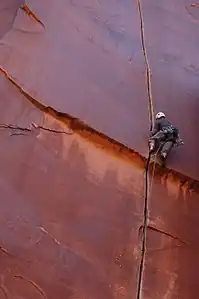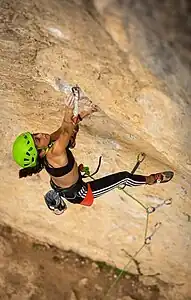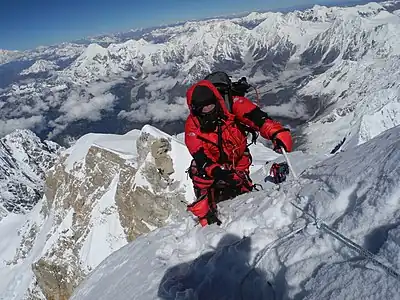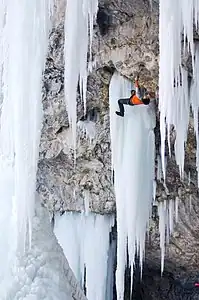| Part of a series on |
| Climbing |
|---|
 |
| Lists |
| Types of rock climbing |
| Types of mountaineering |
| Other types |
| Key terms |
Climbing is the activity of using one's hands, feet, or other parts of the body to ascend a steep topographical object that can range from the world's tallest mountains (e.g. the eight thousanders) to small boulders. Climbing is done for locomotion, sporting recreation, for competition, and is also done in trades that rely on ascension, such as rescue and military operations. Climbing is done indoors and outdoors, on natural surfaces (e.g. rock climbing and ice climbing), and on artificial surfaces (e.g. climbing walls and climbing gyms)
The sport of climbing has evolved by climbers making first ascents of new types of climbing routes, using new climbing techniques, at ever-increasing grades of difficulty, with ever-improving pieces of climbing equipment. Mountain guides were an important element in developing the popularity of the sport in the natural environment. Early pioneers included Walter Bonatti, Riccardo Cassin, Hermann Buhl, and Gaston Rébuffat, who were followed by and Reinhold Messner and Doug Scott, and laterly by Mick Fowler and Marko Prezelj, and Ueli Steck. Since the 1980s, the development of the safer format of bolted sport climbing, the wider availability of artificial climbing walls and climbing gyms, and the development of competition climbing, increased the popularity of rock climbing as a sport, and led to the emergence of professional rock climbers, such as Wolfgang Güllich, Alexander Huber, Chris Sharma, Adam Ondra, Lynn Hill, Catherine Destivelle, and Janja Garnbret.
Climbing became an Olympic sport for the first time in the 2021 Olympic Games in Tokyo (see Sport climbing at the 2020 Summer Olympics) in that format that included competition lead climbing, competition bouldering, and competition speed climbing disciplines; competition ice climbing is not yet an Olympic sport.[1]
Rock-based
Rock climbing can trace its origins to the late 19th-century, and has since developed into a number of main sub-disciplines. Single-pitch and multi-pitch (and big wall), can be performed in varying styles (including aid, sport, traditional, and free solo), while the discipline of bouldering, is by definition performed in a free solo format.[2][3]
- Single pitch climbing means ascending climbs that are a single rope-length (up to 50-metres) while multi-pitch climbing (and big wall climbing) means ascending routes that are many rope-lengths (even up to 1,000-metres). These two rock climbing sub-disciplines can be conducted in one of a number of ways:[2][3]
- Aid climbing is a form of rock climbing that uses artificial aids such as aiders, pitons, and other mechanical devices to assist in ascending a route. Much of rock climbing began as aid climbing, and even up until the 1970s, many big wall routes required aid climbing techniques (e.g. The Nose and the Salathé Wall).[4]
- Sport climbing is a form of rock climbing that uses no artificial aids (which is known as free climbing), but does rely on permanent fixed bolts (or pitons), for use as protection while climbing (but not as aid); was started in the 1980s in France and now makes up the world's hardest climbs (e.g. Silence).[5][6]
- Traditional climbing is a form of rock climbing that uses no artificial aids (and is thus also free climbing) but unlike sport climbing, the climbers place removable protection such as SCLDs and nuts while ascending that are removed by the second climber; has many famous routes (e.g. Indian Face, Cobra Crack).[7]
- Free soloing is a form of rock climbing that uses no artificial aids (and is thus also free climbing) and where the climber uses no protection (neither sport nor traditional); thus any fall while free soloing could be fatal; deep-water soloing is a form of free soloing where a fall will result in landing into safe water. The 2017 free solo of Freerider became the Oscar-winning film, Free Solo.[8]
- Top rope climbing is a form of rock climbing that uses no artificial aids but as the sole form of protection, uses a pre-fixed rope secured to the top of the route (i.e. is used on single-pitches), and thus should the climber fall, they simply hang off the rope with no risk of any injury; it is not regarded as free climbing but is a popular and safe way to introduce people to free climbing (and common on climbing walls).[9]
- Bouldering: means ascending boulders or small outcrops with no artificial aids (free climbing) and due to the lower height, with no protection (making bouldering a form of free soloing); very tall boulders where a fall could be serious (i.e. up to 10-metres) are known as highball bouldering. Many milestones in bouldering (e.g. Midnight Lightning, Dreamtime and Burden of Dreams) were created by practitioners of bouldering and free climbing.
Competition-based
Competition climbing (sometimes confusingly called "sport climbing"), is a regulated sport of competitive rock climbing that originated in the 1980s, and which is usually done as indoor climbing on artificial climbing walls. The International Federation of Sport Climbing (IFSC) is the official governing body for competition rock-climbing worldwide and is recognized by the IOC and GAISF and is a member of the International World Games Association (IWGA). The UIAA is the official governing body for competition ice climbing worldwide. Competition climbing has three major disciplines:[10][11][12]
- Competition lead climbing is a form of competitive lead climbing performed on an artificial bolted sport climbing route.
- Competition bouldering is a form of competitive bouldering performed on a selection of artificial bouldering routes.
- Competition speed climbing is a form of competitive speed climbing performed on a standardized artificial wall with a top rope.
Mountain-based
- Alpine climbing: Ascending large routes that require rock, ice, and mixed climbing skills but with minimal equipment and no outside support.[13]
- Ice climbing: Ascending ice or hard snow using equipment such as ice axes and crampons, and includes competition ice climbing.[14]
- Mixed climbing: Ascending routes using ice climbing equipment where there is both rock and ice (called dry-tooling if there is no ice).[14]
- Mountaineering: Ascending mountains, which can involve some rock or ice climbing, but unlike alpine climbing can involve support and fixed ropes.
- Via ferrata: Ascending mountain routes using previously installed fixed steel cables, metal rungs, and ladders for protection and aid.
- Scrambling: Climbing rocky faces and ridges, which can include basic rock climbing, but is considered part of hillwalking.
- Solo climbing: Ascending routes alone; can involve ropes (roped solo climbing) and artificial aid; where no protection or aid is used, it is free soloing.
Other recreational-based
- Buildering: Ascending the exterior skeletons of buildings, typically without protective equipment (e.g. as free solo climbing by Alain Robert).
- Canyoneering: Climbing along canyons for sport or recreation.
- Crane climbing: An illicit act of climbing up mechanical cranes, which is a form of buildering.
- Grass climbing: An older form of climbing when climbing steep but grassy mountainsides, often requiring ropes, was undertaken.
- Mallakhamba: A traditional Indian sport that combines climbing a pole or rope with the performance of aerial yoga and gymnastics.
- Parkour: A sport based around smooth movement, including climbing, around urban landscapes.
- Pole climbing: Climbing poles and masts without equipment.
- Rope climbing: Climbing a short, thick rope for speed; not to be confused with roped climbing, as used in rock or ice climbing.
- Stair climbing: ascending elevation via stairs.
- Tree climbing: Recreationally ascending trees using ropes and other protective equipment.
Commercial-based
- Rope access: Industrial climbing, usually abseiling, as an alternative to scaffolding for short works on exposed structures.
- A tower climber is a professional who climbs broadcasting or telecommunication towers or masts for maintenance or repair.
In film
Climbing has been the subject of both narrative and documentary films. Notable climbing films include Touching the Void (2003), Everest (2015), Meru (2015), The Dawn Wall (2015), Free Solo (2018), 14 Peaks: Nothing Is Impossible (2021), and The Alpinist (2021). The Reel Rock Film Tour is a traveling film festival that exclusively screens climbing and adventure films, and includes the Reel Rock climbing film series.[15]
Gallery
 Free solo climbing in the Verdon Gorge
Free solo climbing in the Verdon Gorge

 Sport climbing on a bolted route in Spain
Sport climbing on a bolted route in Spain Big wall climbing on Zodiac on El Capitan
Big wall climbing on Zodiac on El Capitan


 Ice climbing on Crack Baby in Switzerland
Ice climbing on Crack Baby in Switzerland
 Buildering on the Doran Memorial Bridge
Buildering on the Doran Memorial Bridge
See also
References
- ↑ "From Doha to Tokyo: onward and upward for sport climbing - Olympic News". International Olympic Committee. 2019-10-30. Retrieved 2019-11-06.
- 1 2 Ronald C. Eng, ed. (October 2010). "Chapter 12: Leading in Rock". Mountaineering: The Freedom of the Hills (8th ed.). Quiller Publishing. pp. 255–276. ISBN 978-1594851384.
- 1 2 Long, John; Gaines, Bob (August 2022). "Chapter 13: Multi-pitch climbing". How to Rock Climb (6th ed.). Falcon Guides. pp. 335–369. ISBN 978-1493056262.
- ↑ The Mountaineers (2018). "Chapter 15. Aid and Big Wall Climbing". Mountaineering: The Freedom of the Hills (9th ed.). Quiller Publishing. pp. 276–317. ISBN 978-1846892622.
- ↑ Andrew Bisharat (6 October 2009). "Chapter 1: Ethics, Style and Emergence of Sport Climbing". Sport Climbing: From Toprope to Redpoint, Techniques for Climbing Success. Mountaineers Books. ISBN 978-1594852701. Retrieved 23 August 2023.
- ↑ Long, John; Gaines, Bob (August 2022). "Chapter 11: Sport Climbing". How to Rock Climb (6th ed.). Falcon Guides. p. 291-310. ISBN 978-1493056262.
- ↑ Long, John; Gaines, Bob (August 2022). "Chapter 12: Trad Climbing". How to Rock Climb (6th ed.). Falcon Guides. p. 311-334. ISBN 978-1493056262.
- ↑ Osius, Alison (4 June 2022). "Free Solo Rock Climbing and the Climbers Who Have Defined the Sport". Climbing. Retrieved 26 November 2022.
- ↑ Long, John; Gaines, Bob (August 2022). "Chapter 9: Top roping". How to Rock Climb (6th ed.). Falcon Guides. pp. 235–258. ISBN 978-1493056262.
- ↑ "A History of Climbing Competitions Since 1985". Gripped Magazine. 15 July 2019. Retrieved 24 February 2023.
- ↑ White, John (2014). "Chapter 12: Competition Climbing". The Indoor Climbing Manual. Bloomsbury Sport. pp. 166–173. ISBN 978-1408186626.
- ↑ Dunne, Toby (17 August 2021). "A brief history of competition climbing". British Mountaineering Council. Retrieved 20 December 2022.
- ↑ Holsten, Jens (16 August 2016). "State of the Heart: The Evolution of Alpinism". Climbing. Retrieved 4 May 2023.
- 1 2 Gadd, Will (2021). Ice & Mixed Climbing: Improve Technique, Safety, and Performance (2nd ed.). Mountaineers Books. ISBN 978-1680511260.
- ↑ Bisharat, Andrew (6 September 2022). "The 20 Best Climbing Films of All Time". Outside. Retrieved 28 September 2023.
Further reading
- Climbing Guiding Manual. Association of Canadian Mountain Guides. 2023. Retrieved 10 September 2023.
- Long, John; Gaines, Bob (August 2022). How to Rock Climb (6th ed.). Falcon Guides. ISBN 978-1493056262.
- The Mountaineers (2018). Mountaineering: The Freedom of the Hills (9th ed.). Quiller Publishing. ISBN 978-1846892622.